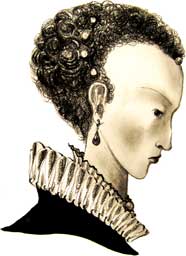When asked about why she chose the terza rima form for this subject,
Marcie Tentchoff replied:
"I've long wondered if there is some link between the power and immortality of the fey, and the fact that they are often portrayed as cold and reserved. That led me to wonder what might happen to a mortal who accepted their aid. It might explain a bit about Elizabeth. I wanted to use a rhyming form that would have been around in that time period, but didn't want limit myself to the sonnet. After looking into a few forms, I realized that the terza rima just felt right. Hopefully I wasn't too influenced by Dante's use of it."
Listen to Marcie read her poem.
Back to the
winners.
Back to the
Table of Contents.

